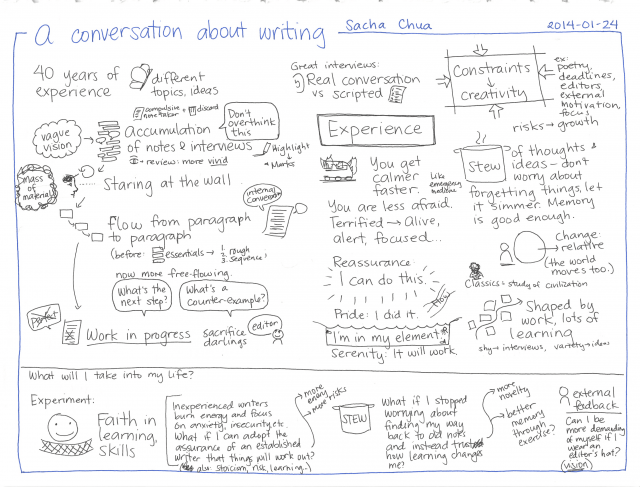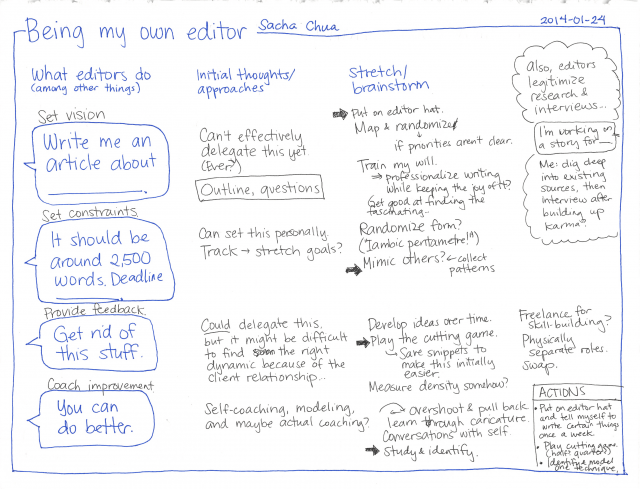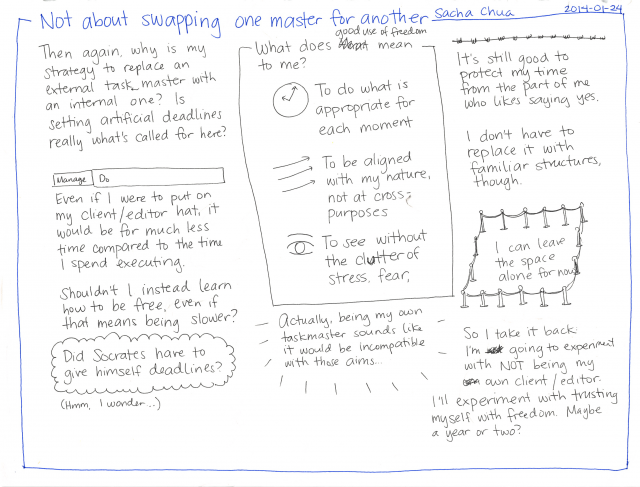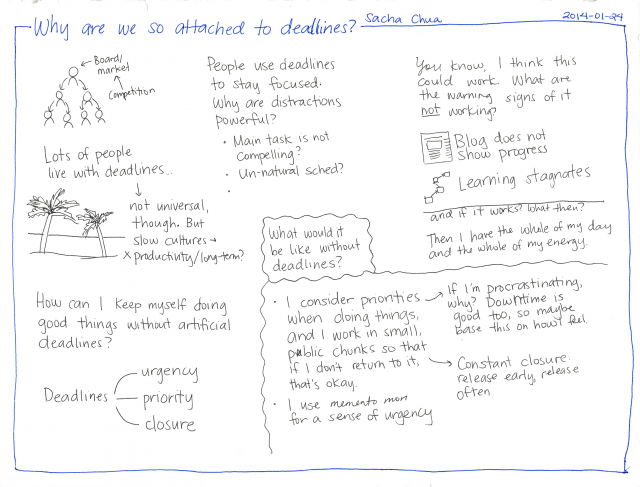A conversation about writing, and reflections on taskmasters
Posted: - Modified: | experiment, writingI'm fascinated by the idiosyncrasies of systems that we build for ourselves over decades. I'm particularly interested in what people find weird about themselves and their systems; what they do the most differently compared to other people. When John Allemang picked my brain about a piece on the Quantified Self, I jumped at the opportunity to pick his brain right back. Here are the notes I drew to summarize the thoughts from our conversation:
It was reassuring to know that one could build a life on a variety of interests, accumulating notes and interviews along the way. I don't have to specialize in a narrow set of topics. I don't have to build expertise in a specific field. There's a lot to learn about how to organize your thoughts and structure your words, but that's not the only thing that experience gives you — it also gives you the confidence that you can do things. Where inexperienced writers let their egos and insecurities get in the way of good interviews and good writing, experienced writers can let go, confident that it will all come together somehow. It reminds me a little of trapeze practice. If you hesitate, if you cling to the bar, you'll never get the thrill of flight. I wonder if I can fool my brain into believing I have all that experience to draw on–to compartmentalize that belief and use it deliberately.
It was also good to know that I don't have to worry about remembering everything. Discarding details is essential. I sometimes imagine that I'd go through life with virtual file cabinets stuffed with clippings and drafts, but then I might drown in irrelevant notes and unfinished possibilities. I asked John if he had a process for managing his archives. He told me that he doesn't particularly worry about it. It's okay to discard. It's okay to let go.
While the historian may bemoan the loss of evidence from these temporary notes, discarding has always been a central feature of effective note-taking. Discarding enhances the utility of notes that are saved by removing materials that have been superseded.… Discarding and forgetting are crucial to effective information management.
Too Much to Know: Managing Scholarly Information Before the Modern Age (Blair, 2010, p.65)
Talking to John gave me a clearer idea of what it might be like to be an experienced writer: to have the clarity of mind to focus on the story, and to have the confidence in yourself so that your self doesn't get in the way of taking risks, learning, and sharing.
We talked a little about freedom and self-direction, which I've been curious about. John sounded skeptical; he values editors and deadlines. Reflecting on our conversation, I wondered what I'd be missing by writing outside the world of work. I've experimented with hiring editors. The editors I found on oDesk and other freelance sites gave me feedback on form, but they don't fulfill the other crucial roles of an editor: choosing a vision for a piece, setting constraints, pushing back on fit, coaching improvement. Writing coaches may be able to do a little more of that, but I'm not sure if the client relationship throws off the dynamic.
I saw in this the same idea I had in becoming my own client – to see if I could enjoy some of the benefits of workplace structure by deliberately stepping into that role. Could I as editor challenge myself the writer to stretch with more difficult topics, more explicit constraints? How could I step outside my writing and coach myself to improve? (You can pay a writing coach, and I'll experiment with that someday, but it also pays to coach yourself – no one could be more devoted and more consistent than you.)
Later that evening, thinking about deadlines and freedom and the liberal arts, I caught myself wondering if this path–easy and familiar as it is, falling back into the structures of the workplace–if this path is really the only way. After all, if I put on the hat of the client or editor or capitalist, and then remove that hat and put on the hat of the worker, am I setting myself up for internal conflict and waste? Wouldn't it be better to be one self, doing the right thing at the right time?
Giving myself directions and deadlines might be useful for avoiding decision fatigue–the cost of making too many decisions–but it is also good to be able to adapt. I do this a little by thinking through scenarios beforehand, so I know what I can do with low-energy and high-energy opportunities. The specific actions I take are influenced by my TODO list, which helps because I don't have to brainstorm good things to do each time. But I rarely commit to doing specific items, and I allow myself space to go off plan.
It would be easy to be my own taskmaster, to set up that rider and elephant dynamic (rational and irrational, logical and emotional). It's understandable. It's productive. Everyone has tasks. Everyone has deadlines. I can even use it to masquerade as normal in cocktail party conversations, griping about an unreasonable boss. (No need to tell them I'm imposing those conditions.)
It's easy to adopt that structure, which is why I'm curious about alternatives. What does good self-direction look like? What would it mean to be good at that? Can I run fast without the whip?
I haven't figured this out yet. It sounds promising, though. At the very least, it's an experiment worth exploring.
So, three things:
- I'm going to borrow the confidence I heard from John. I think that assuming more confidence will let me take greater risks in writing and learning.
- I'll consider using an editor or a writing coach to improve my skills. In order to make the most of that, I can clarify my goals and coach myself as much as possible. That way, I might be able to identify my questions and the parts where self-coaching breaks down. (Like when it comes to murdering your darlings!)
- I'll take a closer look at this instinct towards deadlines and taskmasters, rooted perhaps in a fear that I am not enough. Let's try being plan-less, as paradoxical as that is. Here is where that confidence can help. I trust that it will all work out.
I think I'm coming close to the end of this research into other people's writing systems, at least for now. I've seen a lot of common patterns. If I run across an interesting tip, I'm happy to pick it up. But I'm worried less about making a mistake now that I'll regret in thirty years (such as not archiving every little note, or not having enough associative hooks for memory), and I'm not looking for the one tip that will make me an order of magnitude more effective. There's still a lot to learn, but I can learn that through practice, observation, and small improvements.
Still, so much to learn, and (probably) decades ahead of me… Let's see where this goes!





2 comments
Raymond Zeitler
2014-02-01T21:57:06ZTwo more things to try...
Join a Writer's Group. I'd be surprised if a group doesn't meet F2F weekly or monthly at the Toronto Public library.
Put out the call for commissions. A good way to start any paid assignment is to take over work from someone who has too much work already. Then you might have a legitimate gripe for your next cocktail party! Yet, I wonder if there are any writers who have too much work.
sachac
2014-02-02T01:15:37ZHeh. While it is relatively easy to subject myself to the demands of working for other people, I think it might be more interesting to figure out how to make things that are worthwhile even on my own. Like those Emacs tips - no one's going to commission me to do them, but I think they might be useful. :)